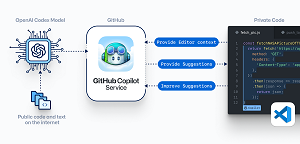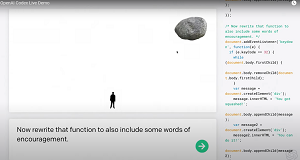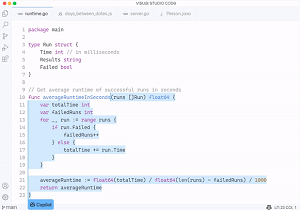News
GitHub Copilot 'AI Pair Programmer' Now Generally Available at $10/Month
After a one-year technical preview, GitHub Copilot, described as an "AI pair programmer" coding assistant, has reached General Availability (GA) status.
Powered by a new AI system developed by OpenAI, GitHub Copilot comes as an editor/IDE extension available for Visual Studio Code, Visual Studio 2022, Neovim and the JetBrains suite of IDEs.
"We specifically designed GitHub Copilot as an editor extension to make sure nothing gets in the way of what you're doing," GitHub said in a June 21 blog post announcing the GA status.
 [Click on image for larger view.] GitHub Copilot (source: GitHub).
[Click on image for larger view.] GitHub Copilot (source: GitHub).
As an AI pair programmer, it provides advanced code-completion functionality and suggestions similar to IntelliSense/IntelliCode, though it goes beyond those Microsoft offerings thanks to Codex, the new AI system developed by Microsoft partner OpenAI. While IntelliCode is powered by a large scale transformer model specialized for code usage (GPT-C), OpenAI Codex is an improved descendent of GPT-3 (Generative Pre-trained Transformer) that can translate natural language into code.
That means developers can create entire projects -- like a simple game -- just from typed-in commands. The new product also provide whole-line code suggestions, complete methods, boilerplate code, whole unit tests and even complex algorithms.
 [Click on image for larger view.] Turning Words into Code (source: OpenAI).
[Click on image for larger view.] Turning Words into Code (source: OpenAI).
"GitHub Copilot distills the collective knowledge of the world's developers into an editor extension that suggests code in real time, to help you stay focused on what matters most: building great software," GitHub said.
 [Click on image for larger, animated GIF view.] GitHub Copilot in Animated Action (source: GitHub).
[Click on image for larger, animated GIF view.] GitHub Copilot in Animated Action (source: GitHub).
Because OpenAI Codex was trained on publicly available source code (including GitHub repos) and natural language, it works for both programming and human languages. Editor extensions send comments and code to the GitHub Copilot service, relying upon context -- file content both in the file being edited as well as neighboring or related files within a project. Relevant context can also be identified via the collection of URLs of repositories or file paths, after which comments and code along with context can be used by OpenAI Codex to synthesize and suggest individual lines and whole functions, the project's FAQ explains.
After the technical preview, it's now available to all developers for $10 per month (or $100 per year), although it will be free for students and maintainers of popular open source projects. It's also available in a 60-day free trial.
"With more than 1.2 million developers in our technical preview over the last 12 months, people who started using GitHub Copilot quickly told us it became an indispensable part of their daily workflows," GitHub said in announcing GA. "In files where it's enabled, nearly 40 percent of code is being written by GitHub Copilot in popular coding languages, like Python -- and we expect that to increase. That's creating more time and space for developers to focus on solving bigger problems and building even better software."
But GitHub Copilot comes with some skepticism, as it has reawakened existential fears among developers afraid it will come for their jobs. It has also been associated with unsecure code and has even been accused as being "unacceptable and unjust" by the nonprofit Free Software Foundation (FSF).
That aforementioned FAQ addresses some of those concerns:
- We do not expect GitHub Copilot to replace developers. Rather, we expect GitHub Copilot to partner with developers, augment their capabilities, and enable them to be more productive, reduce manual tasks, and help them focus on interesting work.
- Public code may contain insecure coding patterns, bugs, or references to outdated APIs or idioms. When GitHub Copilot synthesizes code suggestions based on this data, it can also synthesize code that contains these undesirable patterns. This is something we care a lot about at GitHub, and in recent years we've provided tools such as GitHub Actions, Dependabot, and CodeQL to open source projects to help improve code quality. Of course, you should always use GitHub Copilot together with good testing and code review practices and security tools, as well as your own judgment.
- We acknowledge that fairness and inclusivity in code generation systems are important emerging research areas. We are working with experts, including Microsoft's Office of Responsible AI, in an effort to advance GitHub Copilot's responsible AI practices. We will also review new research and learn from feedback we receive to improve GitHub Copilot such that it is usable by a wide range of developers and provides similar quality of service to people with different backgrounds.
While GitHub Copilot is now available to individual developers, it won't become available to companies until later this year.
"With GitHub Copilot, for the first time in the history of software, AI can be broadly harnessed by developers to write and complete code," GitHub said. "Just like the rise of compilers and open source, we believe AI-assisted coding will fundamentally change the nature of software development, giving developers a new tool to write code easier and faster so they can be happier in their lives."
About the Author
David Ramel is an editor and writer at Converge 360.